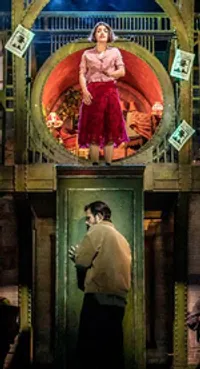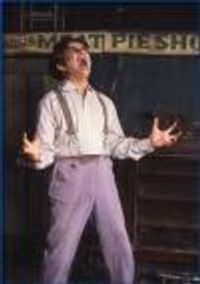NYT: The Loss of Subscribers Who Went to Everything
#25NYT: The Loss of Subscribers Who Went to Everything
Posted: 9/4/23 at 3:48pm
It's very sad. It feels like the non-profit theater model in the US is collapsing. Like everything else today, there is no single problem to blame. But in terms of solutions, the best that I've seen so far to both maintain and create new audiences is "pay-what-you-wish" nights. It sounds like a counter intuitive business model but many successful business (and global exporting countries) have operated at a loss for years until their customer base was strong. Perhaps the deep pockets of the "DeVos Institute" could prepare a study of how free ticket nights can build audiences.
VintageSnarker
Broadway Legend Joined: 1/30/15
#26NYT: The Loss of Subscribers Who Went to Everything
Posted: 9/4/23 at 9:48pm
BETTY22 said: "This is heartbreaking.
I understand the need to bring in a new, younger audience tomorrow - but at the same time you can’t alienate the folks who are the base today.
Sometimes I fear we are moving too fast and not paying enough attention to the audience we have today.
"
I don't agree with the premise that "woke" shows don't have an audience, but I do question if the shows being programmed are what their intended audiences want to sit through. And sometimes there is a marketing/publicity issue drawing in audiences who haven't been catered to before. Part of it is that no group is a monolith so you can't just have a show for "insert ethnicity" and expect them all to show up and approve of it. Look at the varied responses to Here Lies Love. But especially with the plays, I don't think a lot of them are what the intended audiences want and so no one is happy except the small group who gets to congratulate themselves for hiring a BIPOC playwright/seeing a show with a diverse cast even if the play/production is unmemorable and doesn't resonate with much of the community it purports to represent. (Replace ethnicity with sexuality, gender identity, neurodivergence, disability, etc.)
There will always be misguided productions and failed experiments. The subscription model is just no longer reliable to support them.
#27NYT: The Loss of Subscribers Who Went to Everything
Posted: 9/5/23 at 12:54am
Honestly, of the main reasons I haven’t subscribed to anything in my area is simply that the programming is almost uniformly heartwarming, uplifting, family-friendly audience-pleasers. Is it so niche to want to be electrified by a play, rather than sweetly fondled? The only company that’s tackling subject matters that interest me is, oddly, the modern dance troupe, which regularly packs their house.
#28NYT: The Loss of Subscribers Who Went to Everything
Posted: 9/5/23 at 2:38am
I think the problems with the “woke” bs is that it’s preaching to the choir. If you’re going to the theater or reading this message board you’re probably aware of all the **** going so you want to go to the theater to escape and enjoy. Something like August Osage county or Proof where they excite you and make you wonder what will happen next instead of being slapped in the face over and over again about how shifty the world is.
but also let’s face the facts, people like to see people who look like them. I’m not saying this is true for everyone but there’s a reason the Madea plays are successful within the black community and why something like Doubt or Angels in America would not. That’s the truth. So if the majority of your ticket base is old white people.. they probably don’t want to see sit through 4 different shows that are about the POC experience.
JasonC3
Broadway Legend Joined: 4/22/21
#29NYT: The Loss of Subscribers Who Went to Everything
Posted: 9/5/23 at 7:56am
I do wonder if some theaters are over-emphasizing the POC angle in their show marketing instead of messaging the elements of the human experience present in a show and pushing a potentially broader appeal. It is a subtle shift in tone and language that might connect with people who otherwise are somewhat unsure of a show's appeal for them.
The marketing team for one of the performing arts organizations I serve as a board member refers to this audience as the "might attends." We collectively spend a lot of time thinking about what we can to to shift them from a maybe into a "definitely will attend," both in general and for specific productions.
#30NYT: The Loss of Subscribers Who Went to Everything
Posted: 9/5/23 at 5:04pm
^I was wondering about that too. This is a big generalisation, but for better or worse, I think some of us white people are more likely to go to a play pitched as "This show is going to be funny/tense/tear-jerking/whatever, for these reasons! And by the way, it's also written by and/or centres the experiences of minority group/s!", as compared to how modern play descriptions sometimes lead with "Joe Bloggs is [group membership] and [group membership], and their new play incisively examines the [group] [group] experience."
Ensemble1671017357
Chorus Member Joined: 12/14/22
#31NYT: The Loss of Subscribers Who Went to Everything
Posted: 9/5/23 at 7:07pm
JSquared2 said: "What it boils down to is that many of the NFP artistic directors and their staffs listened to the loud and vocal minority (mostly those on social media who don't buy tickets anyway) and believed that the world had changed overnight and therefore their programming had to reflect those changes. They programmed their seasons in order to try and appease the "social justice warriors" but instead wound up alienating their core audience --- who had no problem with staying home and dropping their subscriptions. It's like if tomorrow McDonalds switched to a vegan gluten-free menu and expected their customer base to just change their eating habits."
THIS^^^
#32NYT: The Loss of Subscribers Who Went to Everything
Posted: 9/5/23 at 7:37pm
RippedMan said: "I think it is a generational thing. I don't know many millennials or younger that go to the theater. I go all the time, but I don't buy a subscription. And that's partly due to not being interested in every show. Which goes back to programming. I get that there was a shift in culture, but not every show needs to be that or be so heavy handed. Sometimes people just want a nice fun night out. I think that's why a lot of the more culturally pointed pieces failed on Broadway. People want fluff right now. The world is on fire. We just want to laugh and dance to Michael Jackson."
Many people want nothing to do with Michael Jackson.
#33NYT: The Loss of Subscribers Who Went to Everything
Posted: 9/5/23 at 7:41pm
JSquared2 said: "What it boils down to is that many of the NFP artistic directors and their staffs listened to the loud and vocal minority (mostly those on social media who don't buy tickets anyway) and believed that the world had changed overnight and therefore their programming had to reflect those changes. They programmed their seasons in order to try and appease the "social justice warriors" but instead wound up alienating their core audience --- who had no problem with staying home and dropping their subscriptions. It's like if tomorrow McDonalds switched to a vegan gluten-free menu and expected their customer base to just change their eating habits."
So the nonprofits should just keep doing shows that appeal to old white straight people?
JasonC3
Broadway Legend Joined: 4/22/21
#34NYT: The Loss of Subscribers Who Went to Everything
Posted: 9/5/23 at 8:15pm
^ Oh come on. That's not what the poster suggested at all and many nonprofits have not only programmed for old straight white people for some time.
Nonprofit theater seasons have always been a calibrated mix of shows designed to appeal to a range of audiences. Theaters who want to change that mix in a significant way in order to attract new audiences run the risk of losing many of the patrons they've relied on for years as their ticket revenue funding base.
It's not either/or. It is an AND, but one that has to be carefully managed since new audiences aren't guaranteed (as we've seen repeatedly the past couple of seasons on Broadway) and more diverse programming is only one of many challenges theaters face right now.
As a board member for many nonprofit arts institutions, we have a legal fiduciary responsibility that extends into the oversight we exercise over the fiscal implications of artistic choices. I have yet to be in a conversation that advocates keeping things as they always have been. But potentially losing some (if not many) of your existing customers without having data and other evidence that new patrons will replace them is risky, if not borderline irresponsible.
#35NYT: The Loss of Subscribers Who Went to Everything
Posted: 9/5/23 at 8:25pm
JasonC3 said: "Oh come on. That's not what the poster suggested at all and many nonprofits have not only programmed for old straight white people for some time.
Nonprofit theater seasons have always been a calibrated mix of shows designed to appeal to a range of audiences. Theaters who want to change that mix in a significant way in order to attract new audiences run the risk of losing many of the patrons they've relied on for years as their ticket revenue funding base.
It's not either/or. It is an AND, but one that has to be carefully managed since new audiences aren't guaranteed (as we've seen repeatedly the past couple of seasons on Broadway) and more diverse programming is only one of many challenges theaters face right now.
As a board member for many nonprofit arts institutions, we have a legal fiduciary responsibility that extends into the oversight we exercise over the fiscal implications of artistic choices. I have yet to be in a conversation that advocates keeping things as they always have been. But potentially losing some (if not many) of your existing customers without having data and other evidence that new patrons will replace them is risky, if not borderline irresponsible."
Try quoting messages in the future so people know what you are responding to, but in any case, multiple posters on this thread have expressed that diversity in subscription theatre has not worked out and supposedly that is why audiences have fled. So, I guess we’re back to the straight white plays that will appeal to the old white peoples.
JasonC3
Broadway Legend Joined: 4/22/21
#36NYT: The Loss of Subscribers Who Went to Everything
Posted: 9/5/23 at 9:05pm
Matt Rogers said: "Try quoting messages in the future so people know what you are responding to, but in any case, multiple posters on this thread have expressed that diversity in subscription theatre has not worked out and supposedly that is why audiences have fled. So, I guess we’re back to the straight white plays that will appeal to the old white peoples."
My message immediately followed yours so I think it is pretty clear to whom I was responding. Since you seem to have only one immovable position on this topic, I now know not to engage in good faith with you in the future. My mistake for having taken the time to do so in the first place.
Rainah
Broadway Star Joined: 11/24/16
#37NYT: The Loss of Subscribers Who Went to Everything
Posted: 9/5/23 at 10:29pm
I don't think it's as simple as diverse or not. The question is HOW. Theatres are attempting to court audiences that don't normally go to the theatre, but without taking the time and energy to nurture those audiences. Are they networking with diverse groups? Getting important stakeholders in the community involved/onboard? Doing outreach in schools and other community places where the groups they're courting tend to be?
Theatre going is a habit that, like it or not, is most common in old white people. You want other groups to show up you have to help them build that habit.
The old model is dead. There's no going back to catering just old white people. Theatres need to reinvent, or die
#38NYT: The Loss of Subscribers Who Went to Everything
Posted: 9/6/23 at 12:56am
Just want to take a moment to acknowledge and appreciate how this thread has (mostly) been a productive conversation filled with posts by people who clearly took the time to articulate their thoughts, feelings, and ideas in a manner which promotes actual discourse. More of this please!
Videos






